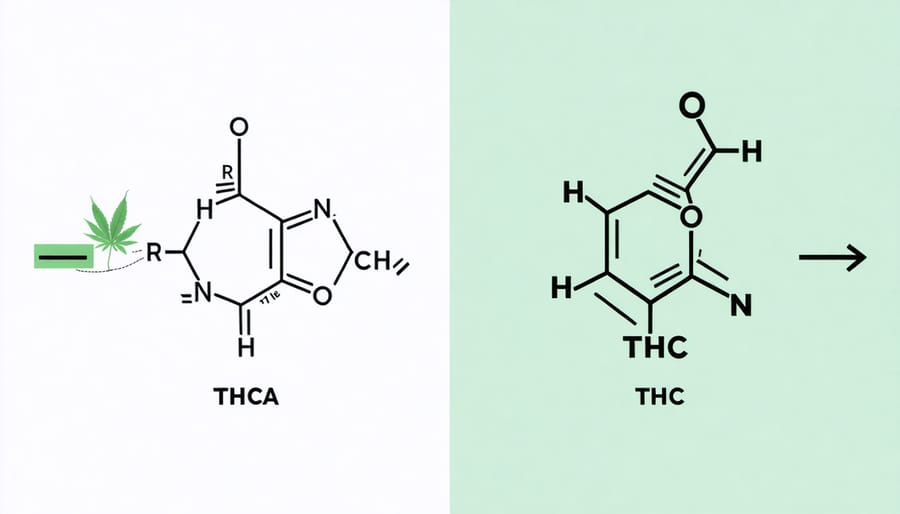
Explore how thca buds can naturally support wellness in a Christian context. Begin by understanding the therapeutic properties of THCA. This compound in its raw form, found in cannabis, aligns with holistic approaches to health and spirituality. Research its anti-inflammatory and neuroprotective benefits, considering their place in faith-based wellness practices. Engage actively in discussions with knowledgeable faith leaders to discern its role within Christian values, bridging science and spirituality. Incorporate insights from these conversations to enhance educational spaces, promoting inclusive dialogues on wellness. Utilize resources to further explore its applications and products that align with faith-based health perspectives. Leverage THCA’s wellness potential within pastoral care or community education by integrating its holistic benefits. Encourage spiritual growth by aligning this understanding of creation with theological teachings, fostering both physical well-being and spiritual fulfillment. Ensure these steps are taken within a framework respectful of diverse theological viewpoints.
Understanding THCA: Beyond the Basics
THCA vs. THC: Clarifying the Distinctions
In the realm of Christian wellness education, understanding the difference between THCA and THC is essential for aligning with spiritual values. THCA, or tetrahydrocannabinolic acid, is the non-psychoactive precursor to THC, the compound known for its mind-altering effects. Unlike THC, THCA does not produce a “high” and is found predominantly in raw cannabis. This distinction is central when considering the Christian perspective on CBD and its legal status. Chemically, THCA is converted to THC through a process called decarboxylation, commonly occurring during heating. While THC’s psychoactivity brings legal and ethical challenges, THCA’s non-intoxicating nature may offer wellness benefits without contravening spiritual guidelines. Emphasizing informed discernment and a global outreach, Christian leaders and educators are encouraged to explore THCA’s potential for enhancing spiritual and educational development while adhering to legal frameworks.

The Health Impacts of THCA
THCA, or tetrahydrocannabinolic acid, has garnered attention in wellness discussions for its potential health benefits, which align with a holistic Christian perspective on care. Current research highlights THCA’s notable anti-inflammatory properties, making it a promising natural remedy for reducing inflammation and managing pain without psychoactive effects. By engaging with these findings, individuals pursuing theological education can explore how such compounds may complement traditional spiritual practices in promoting physical health. THCA’s role in mitigating pain further underscores its potential in supporting those dealing with chronic conditions, aligning with the Christian calling to alleviate suffering and enhance well-being. This integration of faith and health science reflects a compassionate approach, encouraging ministry leaders and educators to consider diverse methods in fostering holistic health within their communities.
Integrating THCA into Christian Wellness Education
THCA and Spiritual Wellbeing
In exploring the relationship between THCA and spiritual wellbeing, we find a unique intersection where faith and health converge to foster holistic growth. THCA, a non-psychoactive compound, offers potential benefits that may enhance both physical and spiritual wellness, aligning with the core Christian principle of honoring the body as a temple. Recognizing one’s body as a gift from God encourages integrative approaches to health, seeking balance and healing through natural means.
Theologically, this reflects the call to stewardship, not only of our external environment but also our own physical and spiritual states. Embracing THCA in a faith-based context requires careful consideration, yet it can be seen as a manifestation of God’s creation, providing pathways toward better health and deeper spiritual connection. Moreover, by engaging with THCA responsibly, individuals can experience improved physical wellness, potentially leading to enriched spiritual practices and insights.
In Christian wellness education, integrating THCA can empower ministry leaders and students by offering a new dimension to their understanding of faith and health. This fosters an environment that nurtures spiritual potential, enhances leadership qualities, and embraces a global outreach that resonates deeply with diverse cultural backgrounds.

Case Studies: Churches and Communities Embracing THCA
In an inspiring journey towards integrative wellness, several Christian communities have embraced the educational use of THCA, showcasing its potential in faith-based settings. For example, a church in Colorado developed a comprehensive wellness program incorporating THCA with the goal of fostering holistic healing. This initiative involved informative workshops that educated congregants about THCA’s potential benefits, emphasizing its role in supporting physical well-being and spiritual mindfulness. Participants noted enhanced relaxation and spiritual focus, which not only enriched their personal faith journeys but also strengthened communal bonds.
Another noteworthy case is a ministry in California that creatively integrated THCA into their mindfulness retreats. Through guided meditations and scripture studies, attendees explored a deeper spiritual connection while responsibly using THCA, leading to profound personal revelations and wellness breakthroughs. Leaders from this ministry reported that integrating THCA facilitated an environment of openness and reflection, laying the groundwork for an inclusive community.
Meanwhile, a smaller congregation has subtly infused THCA education into their gatherings by incorporating elements like health-focused snacks into Bible study sessions. This approachable introduction helped demystify THCA for new users, providing both physical and spiritual nourishment. These examples reflect an encouraging trend where THCA becomes a companion to spiritual and personal growth within Christian contexts, offering a supportive path to understanding and acceptance.
Academic Perspectives: THCA in Theological Education
Incorporating THCA into Curriculum
Incorporating THCA into the curriculum of Christian wellness education offers an opportunity to merge theological insights with contemporary health discussions. Within the framework of theological education online, educators can present THCA as a subject that extends beyond mere health benefits, exploring its spiritual implications and ethical dimensions. Teaching THCA requires navigating cultural sensitivities with respect and understanding the diverse backgrounds of students and ministry leaders. Emphasizing ethical considerations, this approach encourages students to think critically about THCA’s role in holistic health, guided by Christian values. Lessons can focus on responsibly discerning THCA’s use in promoting physical wellness and spiritual well-being, reinforcing leadership potential in health ministries. By fostering a global outreach perspective, educators empower students to engage in informed discussions on natural substances within their communities, always aligning knowledge with spiritual growth and sound Christian ethics. This integration ultimately seeks to nurture leaders adept in bridging faith and wellness within diverse cultures.

Faculty and Institutional Challenges
Integrating THCA into Christian wellness education presents both unique challenges and opportunities for faculty and institutions committed to fostering holistic growth. A primary concern is ensuring theologically sound perspectives on THCA use that harmonize with biblical teachings. Institutions may face resistance from stakeholders who question the alignment of cannabis-derived compounds with Christian values. Educators must navigate diverse cultural views on cannabis, requiring sensitivity and openness to dialogue. Additionally, accessing reliable, scientific information about THCA’s health benefits and spiritual implications is essential to maintain academic rigor and credibility.
Another challenge is developing curricula that empower students to harness the potential of THCA within a faith-based framework while respecting legal and societal norms. Institutions need to provide clear guidance and support structures for faculty, facilitating professional development in wellness education that is informed by both scientific research and spiritual discernment. By addressing these challenges thoughtfully, Christian educators can inspire and nurture the next generation of leaders equipped to advocate for wellness in diverse contexts, advancing global outreach and spiritual healing.
Philosophical Reflections on THCA and Faith
In contemplating the role of THCA within Christian wellness education, we are invited to explore a harmonious relationship between this naturally occurring compound and deeply-rooted Christian values. A foundational philosophical question arises: How do our engagements with the natural world, as seen through substances like THCA, align with our faith and ethical commitments?
From a theological perspective, the biblical narrative often celebrates creation as a divine gift, intended for the well-being and stewardship of humanity. THCA, as part of this created order, can be viewed as a component designed to reflect God’s intention for health and holistic well-being. Christian ethics, centered on love, care, and wholeness, invite us to consider THCA within frameworks that prioritize human dignity and respect for creation.
In recognizing THCA’s potential benefits, Christian educators and ministry leaders are encouraged to engage in thoughtful dialogue, balancing scriptural teachings with scientific understanding. This encourages a faith-based approach that values informed choices, promoting wellness while acknowledging individual conscience and the diverse backgrounds of believers.
Ultimately, this exploration of THCA in Christian wellness education serves as a platform for spiritual growth and leadership development. It encourages a global outreach, inviting believers to act as stewards of their health and environments, all while nurturing their spiritual and leadership potentials. As we embrace these dialogues, we contribute to a broader understanding that supports wellness education aligned with Christian faith principles.
Conclusion
In the intersection of faith and wellness, THCA emerges as a compelling topic for Christian educators and leaders. By exploring this natural compound through a lens of faith, we unveil pathways for integrating holistic health within Christian education. Embracing THCA as part of a wellness program encourages a balance between physical health and spiritual vitality. With theological insights guiding us, the integration of THCA can promote informed, faith-based decisions that respect diverse cultural perspectives and personal convictions. This approach requires us to embrace a spirit of humility and inquiry, recognizing the potential for spiritual growth and leadership development.
As we conclude, we invite readers to further explore the role of THCA in their educational and wellness journeys. Approach this endeavor with openness, guided by a desire for a holistic understanding of health that encompasses mind, body, and spirit. By doing so, we honor our calling to serve with compassion and wisdom, fostering environments enriched with the transformative potential of faith and learning.


